The development cycles of road cars and race cars are very similar. The big difference is that the development cycles of race cars tend to be significantly accelerated when compared to the road-going examples. Competition can be cut-throat, and any driver who doesn’t keep up the pace can find themselves wandering around at the back of the pack pretty quickly. It also means that today’s “must-have” will soon become tomorrow’s outdated model. Car owners don’t tend to be sentimental about it, and these older cars are usually sold on to new owners or find their way to the scrapyard. Finding an older race car that is well-preserved is rare, especially if it is a vintage stock car. That is where this 1941 Studebaker fits into the equation. It isn’t just a survivor, but it has survived in remarkable condition. The owner has decided to part with it, so he has chosen to advertise it here on Barn Finds Classifieds. It is located in Central Virginia, and you can take it home by merely handing the owner $9,850.
There’s not a huge amount known about the history of this Studebaker. Who built it and when is a mystery, but we know that a previous owner had the vehicle up until the early 1980s. He had owned it for at least 35-years, which means that he could have built it originally. I will say that the build quality does seem to be better than average for a vehicle of this vintage. It is fitted with a roll cage, and while it wouldn’t comply with modern safety standards, the finish looks very nice. The panels look excellent, with no signs of any rust or significant damage. The paint is said to be older, but it still presents well. There’s no doubt that it would sparkle under lights at your local dirt track. It features the external bar-work that you would expect from the era, along with steel wheels that are narrow by today’s standards.
The Studebaker promises to be an entertaining beast when you point it at the track. Under the hood is a Packard V8, which is believed to be a 374. This has been fitted lower and further back in the engine bay, which would improve handling. In standard form, this was an engine that would have been producing around 300hp. That was in the days before it was treated to solid lifters, adjustable pushrods, and a brace of four single-throat Holley carburetors. You could be pretty sure that you’d know all about it if you buried the right boot. The front axle is a ’39 Ford unit, which was a typical update in this era. The owner recently treated the beast to a new battery and some fresh fuel. It now runs and drives, but he does suggest undertaking a full inspection before pointing it out of the pits towards a track.
Moving the engine back did create a few of its own problems, and this Studebaker demonstrates an innovative approach to addressing one of these issues. The distributor is challenging to access, so the original owner chose to fit a steel door to the firewall. This alleviates the problem and shows how race car builders sometimes have to think outside the box when engineering their vehicles.
The interior of the Studebaker is generally correct for a Stock Car of this era. The padding on the roll-bars would be a later addition, as is the wheel. Otherwise, the roll-cage design is about right, and it does seem to be well made. All of the interior metal is painted nicely, and there is a single seat for the driver. A small cluster of Stewart Warner gauges monitors the health of the V8. There are no creature comforts and no sound deadening. This interior is built for a single purpose, but it does still present well. I’ve always been an advocate for presenting race cars well, no matter the competition level. This makes it easier to impress potential sponsors. If you can find someone to pay for at least part of your racing exploits, then that is never a bad thing. If a potential sponsor looked at this Studebaker, they couldn’t help but be impressed by its overall presentation.
You know, this really isn’t fair. I hung up my helmet for good 5-years-ago, and I vowed and declared that my retirement was going to be permanent. Then a car like this 1941 Studebaker Stock Car comes along, and that long-dormant desire is suddenly rekindled. I’m glad that there are many thousands of miles between me and this classic because I would hate to try to explain it to my wife if this car turned up in my driveway. Maybe your situation is slightly different from mine. If it is, why not give this beauty some careful consideration. It promises a world of enjoyment for its next owner, and having fun is never a bad thing.
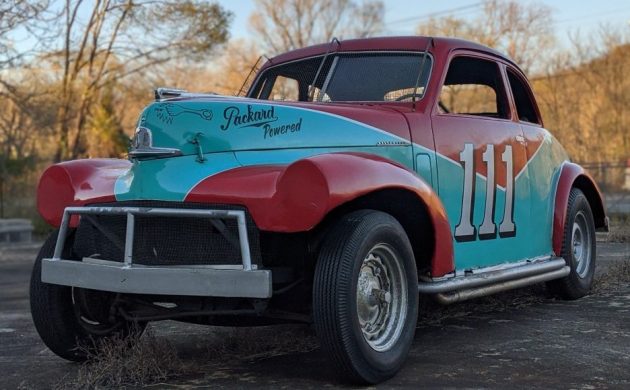

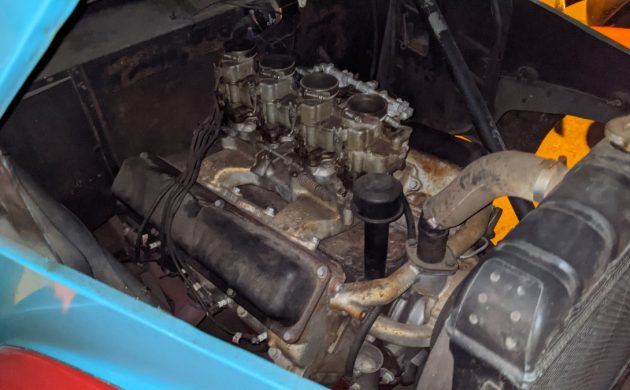
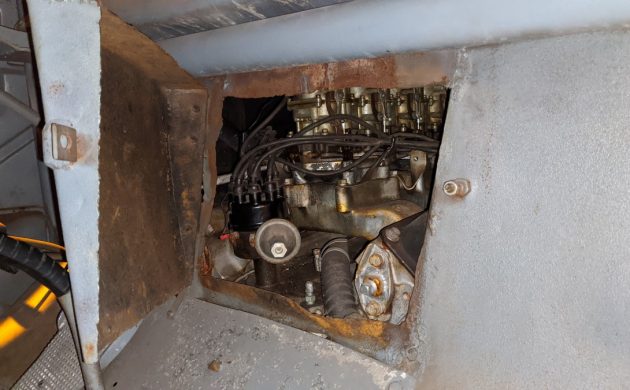
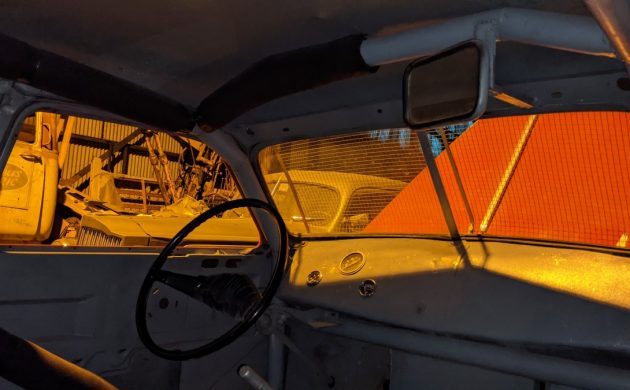
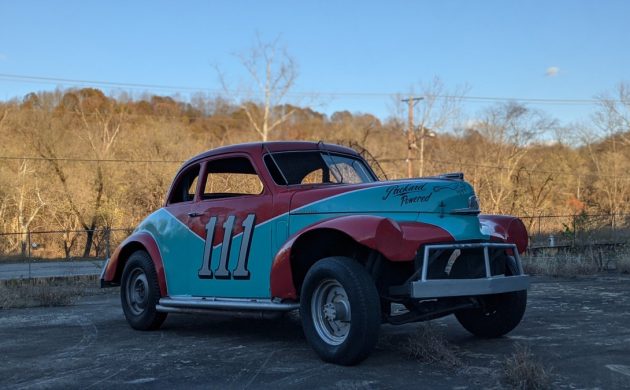





One reason this is so rare is that most stock cars of the era , when banged up, were simply pounded back into shape and quickly resprayed. Obviously this one got some real TLC along the way.
In my misspent youth, I hung out at oval tracks in eastern PA – especially Reading, Langhorne, and Nazareth. I see this car and I ask myself, was it ever raced? Maybe somebody ran a couple qualifiers at the back of the pack then decided it wasn’t as much fun as it looked and stuck it in a barn.
My first thought was of the old cars from Cars 3. This would be fun to spin around an abandoned dirt track.
Finally a subject that I know something about. I met a guy at the International Studebaker Meet in South Bend, IN in 1988. He told me about this car that he had at home in New Hampshire. He later sent me several poleroid pictures of it. It was this car. Number one thing. It is not a 41, it is a 46. I do not remember the guys name but he was a man of means. He brought a 29 President roadster to the meet and he also had a Studebaker Indy car that he raced in Vintage road races.
I think this belonged to Smokey Tuna Liver Breath Joe. It was the fastest on the Southern Boys track. Its a good thing this was one of those cars that was pulled out of the yard snd buffed out.
Its a good price and looks great 👍
Its going to sell quickly.
For the sake of pedantry, a “brace of four single-throat Holley carburetors” would be eight single-barrels.
Other than that, nice write-up on a nice car!
It is pretty cool, but,,unless it’s been said, I don’t think this is an original stock car from the 50’s. A Packard V8 would have to hail from the late 50’s, and these types of cars were obsolete by then. I think, this is a more modern rendition of a stock car someone built later on. It has a modern GM steering wheel, and they never had roll cages like that, if any at all. And no inside mirrors, that’s what fenders were for. Just too nice. Still, I bet it would be a blast to run.
This is NASCAR’s predecessor. I would love to own this car, but I’m pretty sure I’d get pulled over just for loading it into the trailer.